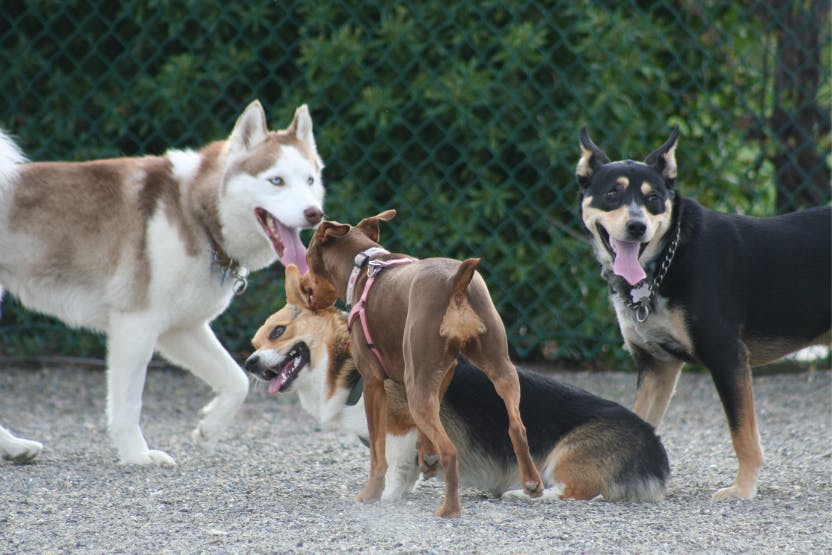
Written by Aurus Sy
Veterinary reviewed by:
Published: 02/04/2022, edited: 02/04/2022
As a doting pet parent, you make sure that your furbaby gets everything they need. You don’t want them to get bored at home while you’re at work, so you’ve been sending them to doggy daycare regularly since they were a young pupper. There, your pooch gets to stay mentally and physically active, as well as make friends.
Now your furry pal is not so little anymore, and you may be wondering if your adult dog still needs daycare. Is there a point where doggy daycare stops being fun for a dog? Let's take a look at why a dog may grow out of doggy daycare.
Do dogs grow out of doggy daycare?
Is it possible for a pup who used to look forward to doggy daycare not enjoy it anymore? The short answer is yes, although it’s not the same for every canine. Some dogs grow out of doggy daycare while others don’t.
This phenomenon is referred to as “aging out” of daycare, and it’s actually more common than one might think. The reason behind aging out of doggy daycare is pretty simple: just like us, our four-legged friends change as they age. And one of the things that changes as your pup matures is their sociability.
Just as a lot of us were excited about big parties in our twenties, but prefer to stay in in our thirties, your dog may grow out of boisterous daycare environments when they become an adult, typically between one and three years of age.
What is dog sociability?
Sociability is defined as the state or quality of being sociable. In the canine world, it refers to a dog’s willingness and ability to interact with other dogs. It’s important to understand that dog sociability is a spectrum and not a fixed trait, and it’s completely normal and natural for dogs to move across the spectrum as they get older.
The levels of dog sociability are:
Dog social. Dog social dogs seek out and enjoy the company of other dogs. They are very easygoing and don’t mind rude behaviors such as humping or barking in their face. This group includes most puppies and a small percentage of older dogs.
Dog tolerant. Dog tolerant dogs get along with most other dogs. They have good communication skills, may be playful or neutral, and generally like interacting with other dogs. While they don’t appreciate pushy behavior, they are able to put up with it.
Dog selective. Dog selective dogs will often have a small circle of doggy friends and be picky about unfamiliar dogs. Because they have a low tolerance for annoying behavior, these dogs may get involved in scuffles.
Dog aggressive. Dog aggressive dogs do not want to interact with other dogs. They have poor social skills and may have one or two doggy friends, or none at all. Dogs who fall on this level of the spectrum require extra support and patience from their guardians.
We expect all dogs to be dog social, but adult dogs who truly enjoy the company of almost every other dog are actually rare. The majority of mature dogs are dog tolerant or dog selective.
Another interesting thing to note is that dog sociability and human sociability are not the same; a dog can be aggressive towards other dogs but friendly with humans.
Can doggy daycare be bad for dogs?
While doggy daycare offers several benefits, it’s not for every dog. The barrage of new sights, smells, sounds, and dogs can be too much for some canines. Younger dogs usually find this type of environment fun and exciting, but for older dogs, it can be overwhelming, stressful, and exhausting. Additionally, if your pup is shy or anxious, daycare may not be the right option for them.
What are the alternatives to doggy daycare?
If your dog is no longer enjoying daycare like they used to, it doesn’t mean that they can’t have a social life anymore. You just need to find other activities that would be more appropriate for them.
Here are some alternatives to doggy daycare:
Arrange playdates with a few of your pup’s dog friends. These can be at your home, at a friend’s house, or a public space.
If you live in an area that has a lot of trails, consider starting a hiking group with dogs your pooch gets along with.
Hire a dog walker to get your dog out and about during the day when you are gone for some less boisterous excitement and exercise.
Have a pet caregiver drop-in on your dog during the day to feed or play with your pup. This ensures that your dog still gets the attention and exercise they need even when you’re busy.
If doggy daycare often extends into the night due to your schedule, have a dog sitter come to your home to keep your pooch company. Or arrange a drop-off to a boarder's home where your pup will be pampered with some one-on-one attention.
It’s normal for a dog’s sociability to change as they mature, but your pup can still have a pawtastic social life even when they’ve aged out of doggy daycare. If your pup needs company while you’re out, book a drop-in, sitting, boarding or walking service with Wag!
Comments (0)
Leave a comment
Related articles
About Wag!
© 2024 Wag Labs, Inc. All rights reserved.
About Wag!
© 2024 Wag Labs, Inc. All rights reserved.
Security
© 2024 Wag Labs, Inc. All rights reserved.